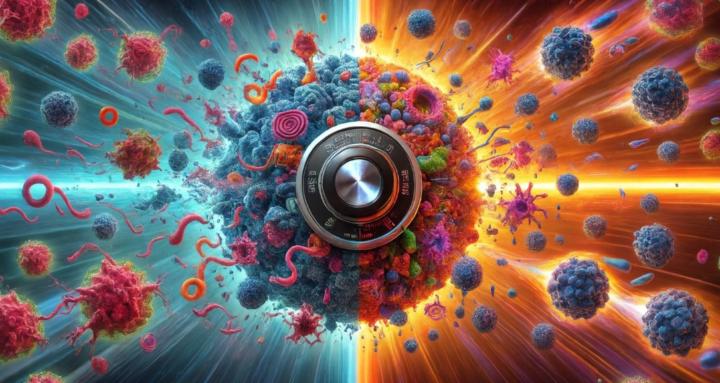Does Fat Feed Cancer? Seyfried vs McLelland Debate
Stephen asked for help finding where Dr. Thomas Seyfried directly debunks the idea that cancer feeds on fat. He was re-reading Jane McLelland’s book How to Starve Cancer, where she asserts that cancer can utilize protein and fat (particularly in prostate cancer). The post sparked a nuanced conversation around metabolic theory, cancer bioenergetics, and the contradictions between leading cancer thinkers. The community strongly leaned toward Seyfried’s stance: that cancer cannot ferment fatty acids or ketones due to their mitochondrial dysfunction. Seyfried maintains that glucose and glutamine are the primary fuels. Multiple members reaffirmed that in a state of ketosis—especially under calorie restriction—normal cells thrive on fat/ketones while cancer cells starve. The group also highlighted the need to critically examine Jane McLelland’s broader dietary advice, particularly her promotion of high-fiber plant-based foods, which contradict ketogenic metabolic therapy. Still, some members shared they found her framework useful when paired with Seyfried’s press-pulse approach. ✅ Supplements & Compounds • Ketone Bodies (BHB/AcAc) — Cannot be fermented by cancer cells • Glutamine — Targeted in pulse strategies • Fatty Acids — Not used by cancer for fermentation, per Seyfried • Off-labels mentioned: Ivermectin, DCA, Fenbendazole • Natural Compounds: Sulforaphane, White Button Mushrooms, Curcumin, Resveratrol • Sleep Optimization Aids: Melatonin, grounding sheets, Oura Ring for REM/HRV tracking ✅ Therapies & Strategies • Prolonged Fasting & Keto Adaptation — Several members report improved mitochondrial health and sleep • Press-Pulse Therapy — Combining metabolic pressure with periodic glutamine inhibition • Grounding Sheets & Sleep Tracking — Part of lifestyle stacking • HBOT (Hyperbaric Oxygen Therapy) — Mentioned to improve restorative sleep ✅ Lab Testing & Tumor Profiling • Liquid Biopsies — Some discussion around CTC analysis for targeted protocols • Tumor Tissue Analysis — Mention of Decipher/OncX, but sample quality often limits use
Reading List: Metabolic Therapy
Bernardo asks the community to share their favorite books on metabolic therapy, health, and cancer management. • Core recommended reads include Seyfried’s, Christofferson’s, and Kalamian’s foundational works on metabolic cancer theory • Community highlights a mix of scientific texts, practical guides, and alternative/integrative approaches • Themes include ketogenic therapy, fasting, mitochondrial support, off-label drug use, deuterium-depleted water, and cancer-specific protocols • Some members express skepticism about books promoting high-fiber or high-carb diets for cancer • Real-world relationships with authors (e.g., Ovadia, Knobbe) and anecdotal success stories boost credibility of select titles ✅ Top Recommended Books 1. Cancer as a Metabolic Disease – Thomas N. Seyfried 2. Tripping Over the Truth – Travis Christofferson 3. Keto for Cancer – Miriam Kalamian 4. How to Starve Cancer – Jane McLelland 5. Cracking Cancer Toolkit – Dr. Jeffrey Dach 6. Naturopathic Oncology – Dr. Neil McKinney 7. Cancer and the New Biology of Water – Thomas Cowan 8. The Cancer Code – Dr. Jason Fung 9. Outside the Box Cancer Therapies – Dr. Paul Anderson & Dr. Mark Stengler 10. The Truth About Cancer (video series) – Ty & Charlene Bollinger 11. The Ancestral Diet Revolution – Dr. Chris Knobbe 12. Stay Off My Operating Table – Dr. Philip Ovadia 13. Dark Calories – Dr. Catherine Shanahan 14. Metabolic Approach to Cancer – Dr. Nasha Winters ✅ Additional Mentions & Insights • Deuterium-Depleted Water (DDW) — praised but noted as expensive • Oncologist blogs like Dr. Jeffrey Dach offer indexed protocols • Dr. Nasha Winters praised by some, but criticized by others for pro-vegetable content • Video content (e.g., Mimi Morgan & Dr. Ovadia, Dr. Fung) cited as helpful additions to books ✅ Key Takeaways • A foundational reading list is forming that combines science, nutrition, and practical action • The Seyfried-Christofferson-Kalamian trio forms the core of metabolic cancer literature
7
0
News: Breakthrough Treatment Flips Cancer Cells Back Into Normal Cells
A December 2024 article shared by Stuart describes Korean researchers reverting colon cancer cells back into normal cells by flipping a few genetic switches — a shift from the traditional kill-based paradigm to reprogramming cancer cells. The thread sparked discussion about how melatonin, Salvestrol, and Artemisinin may already be supporting similar anti-cancer effects via epigenetic and mitochondrial pathways. Dr. Casey Peavler, Dr. Russell Reiter, and others are cited for promoting high-dose melatonin therapy, not only for sleep, but for preventing metastasis and potentially reverting cancer cell behavior. ✅Supplements & Compounds Mentioned as part of current or suggested anti-cancer strategies: ● Melatonin (doses up to 180mg/day or more in cancer settings — no sedation at high doses) ● Artemisinin ● Salvestrol ● Fenbendazole ● Full-spectrum CBD oil (sources: Aspen Green, Cornbread Hemp) ● Ivermectin ● Curcumin, Resveratrol, EGCG (discussed in adjacent posts) ✅ Therapies & Strategies ● Gene reprogramming of cancer cells (as per Korean study) ● High-dose melatonin therapy (Dr. Reiter, Dr. Schallenberger, Dr. Makis mentioned) ● ROS-generating compounds in press-pulse ● Cannabinoid support alongside metabolic therapy ● Combination protocols involving antioxidants on press days and pro-oxidants on pulse days ✅ Lab Testing & Monitoring Not directly discussed, but implied: ● Monitoring for metastasis control ● PET/MRI imaging to observe changes in tumor metabolism and behavior ● Ongoing tracking of symptom regression from community members (e.g., Stuart) ✅ Resources & References Shared ● Original article: NewAtlas — Cancer cells flipped to normal ● Salvestrol study PDF by DMXi ● Dr. Russell Reiter: high-dose melatonin expert ● Dr. Casey Peavler: discusses melatonin and metabolic approaches ● Dr. William Makis: mentions gram-dose melatonin from “Bulk Supplements”
7
0
Identifying Poor Studies
Jason raised a vital concern: how do we critically evaluate the quality of scientific studies? Many studies may be poorly designed, biased, or irrelevant to our specific cancer type. The group emphasized the need for a shared education on interpreting research, highlighting how confirmation bias, funding sources, and study design flaws can mislead even well-meaning patients. Jason emphasized that trusting a study simply because we “like” the conclusion is dangerous. ✅ Supplements & Compounds Discussed (Tangential Mentions) ● Cimetidine (referenced via separate post) ● Fenbendazole & Mebendazole (referenced by David Fajardo in relation to Stanford study) ✅ Therapies & Strategies ● Evidence Literacy: Jason proposes learning how to evaluate: ○ Research questions ○ Study design (RCTs vs. observational) ○ Sample size & population ○ Controls & endpoints ○ Biases (funding, publication) ○ Statistical significance vs. clinical relevance ● Community Data Collection: Melissa Mantilla suggests creating a shared framework to collect and review patient-reported outcomes from KMT protocols. ✅ Lab Testing & Data Interpretation Themes ● Concerns over SOC ignoring relevant data: David Fajardo questioned why a Stanford-published mebendazole study isn’t reflected in his Stanford oncologist’s care suggestions. ● Gaps in translation from research to clinical practice: Melissa expressed frustration that promising low-toxicity treatments get buried in literature without progressing to standard care — even after 15+ years. ✅ Resources & References Shared ● Cimetidine for colon cancer thread ● YouTube: Dr. John Campbell – FenBen for cancer? ● Skool thread on clinical study literacy (by Jason) ● Tools in development: ○ Simon Lown is working on an AI-powered study evaluator that will assign a metabolic therapy relevance score and redirect users to a summarized review of each study. ✅ Key Takeaways
7
0
Discontinuous Ketogenic Diet & Cancer Therapy
Jason shared a now-terminated clinical trial exploring a discontinuous ketogenic diet as a metabolic therapy adjunct alongside standard of care (SOC). Despite its closure, he emphasized that the concept still shows promise: alternating between strict keto and strategic reintroduction of carbohydrates may enhance treatment outcomes. The group reflected deeply on the balance between metabolic flexibility, glucose restriction, and patient sustainability. Some members, like Michael Wright and Joseph Lackland, expressed concern about reintroducing carbs due to cancer’s glucose dependency, while others acknowledged the potential for therapeutic cycling if carefully monitored. ✅ Compounds & Therapies Discussed ● Full Spectrum Cannabis Oil (used by Joseph Lackland) ● Fenbendazole (3x weekly pulsing) ● Hydrogen Therapy (AquaCure AC50): discussed as complementary and possibly synergistic with keto cycles ● Discontinuous Keto Diet: ○ Based on NCT05119010 (terminated), but related studies still ongoing ○ Cycles between ketogenic state and controlled carb refeeding (~100g carbs/day for ~15 days off) ○ Aimed at enhancing immune response and metabolic pressure on tumors ● Strict Ketogenic / Carnivore Diets: ○ Many users reported long-term adherence (1.5+ years) ○ Debate over reintroducing carbs vs. staying ultra-strict ● Hydrogen Therapy: ○ Advocated by Jason Watson as a universal, low-toxicity adjunct ○ Shared links and settings for safe use and troubleshooting (PPM testing, taste changes, avoiding lye ✅ Lab Testing & Metrics ● GKI (Glucose Ketone Index) ○ Targeting GKI <2 for metabolic pressure ○ Concerns raised that even small protein or carb deviations may push glucose up enough to re-feed tumors ● Methionine Sensitivity: Christine Michaud highlighted concern over methionine-rich foods (meat/dairy/nuts) potentially fueling tumor growth (Now debunked by Professor Seyfried) ✅ Resources & References Shared ● Clinical Trial – Discontinuous Ketogenic Diet + SOC (Terminated)
3
0
1-8 of 8

skool.com/metabolictherapy
Metabolic cancer therapy hub sharing research, protocols, and community insights inspired by Dr. Seyfried’s work.
Powered by






